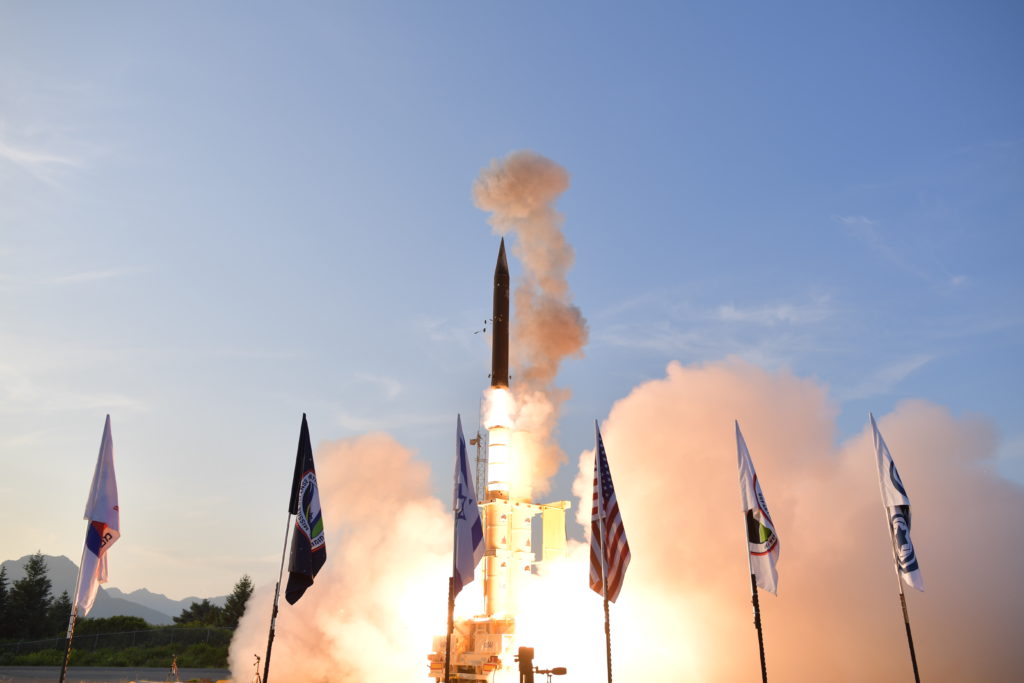
Israel isn’t just cooperating militarily with other countries in their region—according to Defense Minister Benny Gantz, that alliance has already dealt blows to the region’s shared enemy: Iran. Calling the cooperation among unnamed countries in the region the “Middle East Air Defense Alliance”, Gantz said this is being developed “in the face of Iran’s attempts to attack the region’s countries using rockets, cruise missiles and UAVs. This program is already operative and has already enabled the successful interception of Iranian attempts to attack Israel and other countries.”
Gantz, whose comments on Monday to the Knesset Foreign Affairs and Defense Committee were published by Israel, noted that the Alliance has a partner outside the region as well—the United States. “Over the past year I have been leading an extensive program together with my partners at the Pentagon and in the US administration that will strengthen the cooperation between Israel and countries in the region. I hope that we will take another step forward in this aspect during President [Joe] Biden’s important visit [in July].”
Gantz went on to say that the regional air defense alliance is the “first element of this vision” to enhance Israeli-regional coordination.
Israel has enjoyed an unprecedented improvement in relations with Arab nations since 2020, with the Abraham Accords formally setting up peace treaties with multiple regional countries. As a long-time developer of cutting-edge missile defense programs, Israel has much to offer in an air defense alliance both to formal allies who signed the Abraham Accords and possibly to covert partners who have yet to officially sign deals with Israel.
It has also long been understood that Israel and a number of Arab nations share an archenemy in Iran. While it’s unclear who this new air defense alliance involves, including whether it indicates collaboration with any of the nations who haven’t yet signed a peace deal with Israel—such as Saudi Arabia—it nonetheless represents another step forward in partnership between Israel and its neighbors.
Of course, it’s the enmity between Israel and its neighbor Iran that is driving this coordination, and Gantz made it clear that Iran must be faced by more than just Israel. “Iran is not a partner, and in order to achieve a nuclear agreement that will push Iran back from its ambitions, the entire world, led by our friend the United States, must employ political, economic and military pressure,” said Gantz.
The US and other world powers have been negotiating with Iran for over a year on a return to the nuclear compromise agreement that would curb Iran’s nuclear program in exchange for economic benefits. But rather than move forward towards a renewed deal, Iran has only escalated its nuclear program in defiance of the world’s demands.
As a result, Iran is getting more and more isolated. Gantz pointed towards “two significant achievements bringing the international community together to face the Iranian threat” in recent months: a formal condemnation by the International Atomic Energy Agency of Iran’s nuclear misdeeds and keeping Iran’s Islamic Revolutionary Guard Corps on the US Foreign Terrorist Organizations list. The latter achievement followed reports that the US was considering removing the IRGC from the terror sanctions list as part of a renewed nuclear deal.
Of course nuclear threats are just one danger posed by Iran. In his comments on Monday, Gantz also highlighted “Iran’s attempts to carry out attacks on Israelis abroad, particularly those located in Turkey”, asking Israelis to follow guidance from the defense establishment.
He also reiterated a stern warning to Iran should such an attack occur: “I have instructed the defense establishment to prepare for a powerful response in the event that any such threat materializes. We have a variety of options at our disposal—and any harm to Israeli citizens will lead us to employ these means.”
In the end, Gantz noted that “from an operational standpoint and in terms of urgency, the biggest challenge that we face, is the Iranian threat.” Other Middle East nations are facing the same challenge, and now it appears Israel and those countries are facing the danger together.
(By Joshua Spurlock, www.themideastupdate.com, June 21, 2022)
